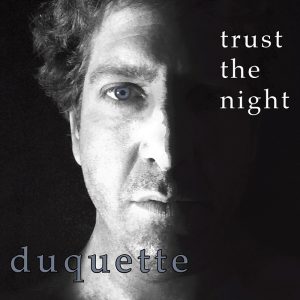
Photo courtesy of the artist
Duquette’s latest CD Trust The Night is an unusual amalgamation of roots music and edgy, classic rock idioms. While his combination of genres and the strong musical personality he uses to weld them together make his music hard to pigeonhole, it also makes his music easy to like. There is a freewheeling sweep of musical styles that come together brilliantly and perfectly in each track.
Title track “Trust The Night” kicks things off with Duquette’s husky voice hovering over a brittle piano melody and alongside rangy harmony vocals, courtesy of the able Andrea Wollstadt. His smooth but hefty voice finds the perfect home amidst an intermittent burst of electric guitar phrase and a jazzy keyboard. Duquette’s rangy vocal during the verses and his sustains during his chorus show a lot of power, both musically and emotively.
“Two Paths” follows a fiddle melody straight into a shuffling groove and other pleasant acoustic instruments. Duquette applies his smooth vocal in a considerate manner, adding enough chirp to match the country flavors around him. His subtle glide into his brief chorus give his song extra lift, adding to the feeling that this song is taking the listener somewhere.
“Touched Ground” is a lighter vocal workout. Duquette, amidst vibrant horn lines and peppy xylophone, glides through this more poppy affair. Catchy in a subtle way, this song just sneaks up on you and the next thing you know, you’re into it.
Guest harmonica player and regional star Jonathan Edwards lulls us right into “Coffee In The Dark” with his lively, seesawing harp melody. Edwards keeps his thicket of melody going as Duquette applies his considerate vocal presence. His earthy vocal also feels quite at home among flinty, rootsie guitar phasing. It’s uncanny how well Duquette can make his vocal fit the shifting sonic landscapes in this album, from classic rock trappings to roots idioms.
“Perfect Stranger” is a jugging piece about intimacy and the lack there of. With a catchy, accessible chorus and inviting xylophone parts, it feels as friendly as pop, as earthy as roots, and all Duquette. Like elsewhere in this album, his unique vocals, fitted to the song like a glove, belongs to this kind of radio friendly ditty as it does to the more classic rock material and the more roots oriented numbers.
Duquette and his band mates get more down home on “Broken Now,” a fiddle and mandolin laced number that sways with a country feel. Using his most earnest, sincere tone, Duquette sings of needing help, shelter, his voice going to work keeping it real. A mournful fiddle line and a cry of mandolin notes falling around him make a perfect sonic backdrop.
“Those Three Songs” is a honky tonk swing, complete with organ swirls, a lilting harmonica line, and an inviting, bar band groove. Duquette manages his vocal duties with a heft that seems to carry all of the instrumentation along with him.
Duquette and his players get flinty on “Decade Of The Beard,” a ode to everything 1970s. They go mid tempo here, with splashy electric guitar, steady smack in the groove, and with Duquette’s earthy vocal sprawling over all. This is a likable rocker with a quirky theme and easeful delivery.
“I Know What To Do” has a slight ska feel, keeping the tune in motion with an amicable gait. A buzzing electric guitar phrase, a bright xylophone melody, and a few horn bursts flavor and color this well. Over that plentitude of sound, Duquette emotes in mellow mode, a flow of sound and feeling that makes one think of a day that’s going very well.
“Somedays” feels like a jubilant marching song, horns announcing their positive tones, bass and drums pumping out an engaging groove. Duquette adds a huskier nuance to his voice, a bluesy rasp that fits this 1920s speakeasy groove. One can almost picture him walking out onto Bourbon Street to lead a New Orleans marching band.
Closing track “We’re All Going” is a mellow, farewell for now to Duquette’s fans. His voice rides up nice and high, sweet, emotive, soulful. Likewise, his band mates give him a pleasant lift, a spiky lead guitar phrase, a playful xylophone, and a thumpy horn line gathered around his heartfelt vocal in a hip weave.
Duquette has done well for himself with this Trust The Night album. He offers an amazing vocal range, a plentitude of instruments, and a variety of good song styles, all of which he masters well.